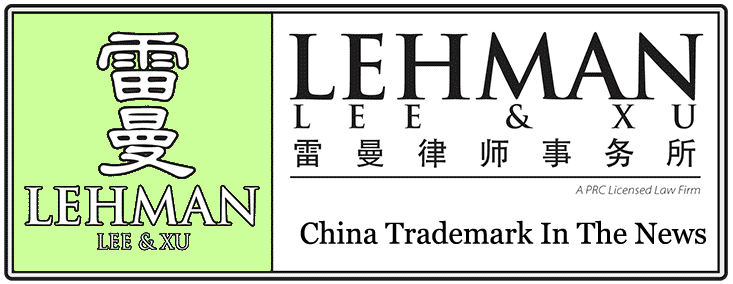
 |
|
LEHMAN, LEE & XU China Lawyer
|
|
China Trademark In The News
|
November 2012 |
The China Law News keeps you on top of business, economic and political events in the China. |
In the News |
Revisions give trademark law more teeth |
Sounds, smells, colors and moving objects can become trademarks under the latest draft amendment of China's Trademark Law, approved at an executive meeting of the State Council on Oct 31. The amendment is "a response to emerging problems", said Zhang Jianhua, an official with the Legislative Affairs Office of the State Council. The law was previously amended in 1993 and 2001, and Zhang said the current amendment mainly focuses on three aspects - making trademark registration more convenient, maintaining fair market competition and increasing punishments for infringement. The State Administration for Industry and Commerce has taken a series of measures since 2008 to improve procedures for trademark examination. The process formerly took up to three years to complete, but the time required has been reduced to less than 10 months, and Zhang said there is still a possibility the period can be further shortened. Under the current law, applicants must submit separate applications to register the same trademark under several different categories. If the draft amendment takes effect, only one application can cover the same trademark in all categories. "Now, if a company wants to apply for a trademark in all of the 45 categories, it needs 45 applications," explained Yuan Qi, a senior official of China Trademark Association. "But in the future, it will need only one." Rather than rejecting entire applications outright if there are issues with the materials submitted by an applicant, the authority will issue a position paper under the new law. The second amendment of the law in 2001 allowed 3D objects to be used as trademarks. The new amendment has also removed requirements that trademarks must be composed of visual elements, meaning sounds and smells can now be registered as trademarks in addition to words and graphics. Similar rules were added as early as 2003 to the trademark law of Taiwan, where the legal system is different from that of the mainland. According to the rules, "words, graphics, signs, colors, sounds, three-dimensional shapes and their combinations" can be registered as trademarks. The protest mechanism has also been improved in the latest amendment. Under the current law, anyone can file a complaint for any reason against a trademark over the three-month review period, which allows the applicant's competitors to raise protests with the malicious intent of stopping it from acquiring the trademark, Yuan said. To prevent abuse of the law, the amendment will specify the grounds for a legitimate protest and limit who can lodge one. Greater penalty "Trademarks play a crucial role in improving a company's competitiveness," said Zhang. Abuse of the trademark system will damage the market environment, Zhang said. "Malicious trademark registration not only does harm to the rights of the trademark owners and consumers but is also a waste of resources," he added. The new amendment is expected to increase the ceiling of fines imposed on trademark infringement from 500,000 yuan ($80,250) to 1 million yuan. Those who have infringed on trademarks more than once will receive even heavier penalties. Using other people's trademarks as company names will also be regarded as infringement.
|
|
|
|
|